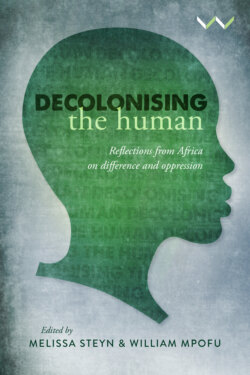Читать книгу Decolonising the Human - Группа авторов - Страница 6
На сайте Литреса книга снята с продажи.
1 The Trouble with the Human
ОглавлениеWilliam Mpofu, Melissa Steyn
All communities create notions of their place within the array of sentient and non-sentient beings with whom they share their worlds. The principal trouble with the grand construction of the human of Euro-modernity, however, is that it was founded on unhappy circumstances and for tragic purposes. Man, as a performative idea, created inequalities and hierarchies usable for the exclusion and oppression of the other. The status of the human was self-attributed to dominant people powerful enough to name themselves and define others. That which was categorised as non-human became things, reduced to resources, usable and disposable by the unapologetic humans. The attribute human, in other words, is not self-evident or assured. It can be wielded; given and taken away. The threat of its withdrawal from, or permanent denial to, weaker peoples in peripheralised spaces continues to define life within a climate of fear that makes being human a fragile condition and an uncertain reality (Soyinka 2004). These dispensable others and objects of power are found everywhere as black people, women, the poor and homeless, refugees and foreigners, gay, lesbian, queer and trans people, the old and vulnerable, people living with disabilities and other others.
The prevailing constructs of ‘man’ and ‘human’ began with the durable handiwork of (male) European humanists of the fifteenth and sixteenth centuries who needed convenient and powerful tools for classifying themselves and categorising others (Mignolo 2015, 158). The male Westerner, as the Christian and paradigmatic human, entered into relationships on grossly unequal terms. Conquerors in the shape of patriarchs, empire builders, merchants and missionaries employed different approaches in disciplining the bodies of the conquered through violence, arresting the appetites and desires of the natives with goods and services, and dominating the minds and hearts of the subjects with gospels and hymns. Conquest was designed to make the conquered docile and obedient, subject to exploitation and ownership.
Mahmood Mamdani (2013) elucidates this political principle as ‘define and rule’, where power is able to name and by so doing dominate its subjects as inadequate people with deficits and lacks, whose oppression may therefore not be so morally wrong. Power has distributive privilege and enjoys the resources of classifying and categorising the objects and subjects around itself. Human differences, in that scheme of constructions, classifications and hierarchisations, are not expressions of human diversity, but excuses for the oppression and exploitation of the other. Power, without naming itself, is able to name, define, judge and place others as weaker. It enjoys the privilege of presenting itself in salvationist, protective, developmentalist, democratic and humanitarian terms that hide the domination it exercises and the often deadly consequences of this for those who have lost their equality and full membership of the human category.
The paradox of Western modernity, therefore, is that its grand rhetoric which announces freedom, happiness, progress and development has marched hand in hand with the logic of coloniality. The coloniality of Western modernity has participated in the appropriation of natural resources, exploitation of labour, legal control of ‘undesirables’, imposition of the interests and world view inherent in a capitalist economy, and denial of the full humanity of the disempowered and the impoverished (Mignolo 2015, 164). The condition of the oppressed is not a condition resulting from natural causes. Gendered violence and inequality are not the inevitable consequence of biology. Peripheralised countries are not undeveloped, their people are not powerless and poor; the countries have been underdeveloped, the people impoverished and also disempowered through displacement and dispossession.
The enslavement and colonisation of Africans was based on their removal from the category of the human. Those who were to be enslaved and colonised first had to lose their human equality and be characterised as inferior and incomplete beings. The work of decoloniality in Africa, therefore, becomes a search for completeness through the recovery, restoration and recognition of the equal belonging of black people to the world. Dani Wadada Nabudere (2011, 1) correctly notes that ‘Afrikology’ as a philosophy is the search for human wholeness in a world that has been defined by loss of equality and denial of the full humanity of the conquered and oppressed. The fight for liberation as a form of social justice is also a struggle for the recovery of denied and lost humanity. Our book is positioned within this decolonial struggle.
